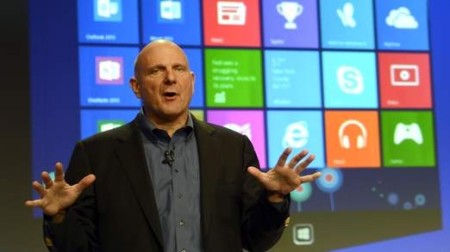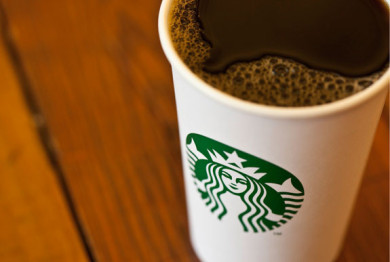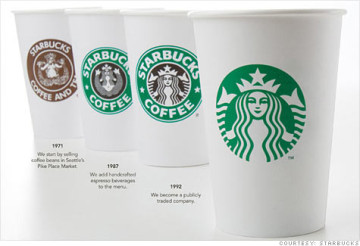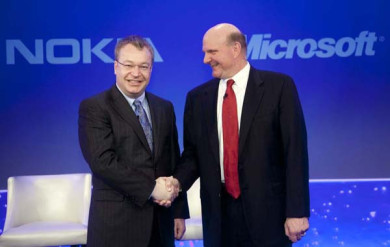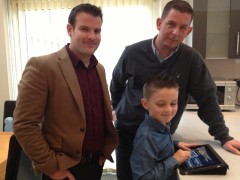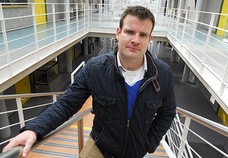Why Microsoft Is Now A Follower Not A Leader
Try as he did to own the stage at product launches, Steve Ballmer didn't have the golden touch for innovation of his late counterpart at Apple, Steve Jobs.
Taking the reigns in 2000 after Bill Gates retired, Microsoft still makes an awful lot of money but mostly from its old products: Windows and Office still dominate the PC market.
But when it comes to online services, mobile and tablets - the technology of now - Microsoft is trailing.
When Ballmer announced a change in strategy six weeks ago for Microsoft to become a devices and services company, investor reaction was pretty muted.
When he announced his retirement, they partied. Shares took off and added tens of billions of dollars to the company's value.
It leaves little doubt who investors believe has been holding Microsoft back.
While the tech world matured and new names like Google, Facebook and Twitter emerged, and old rivals Apple excelled, Microsoft struggled to get things right.
The launch of Windows Vista was plagued with problems. While the XBox has won it a good share of the games console market, its Bing search service has never come close to Google which, in just 15 years, has eclipsed Microsoft to become a byword for innovation.
A case in point is the Surface, Microsoft's answer to the iPad; launched last summer, more than two years later than Apple's product.
Sales disappointed and warehouses were left with plenty of stock. Not even a price cut could save the Surface. Steve Ballmer himself admitted it was a flop.
Microsoft's new strategy is to react faster to changes in the market. Strange talk from a company that was once a leader, not a follower.
The Murky World Of Energy Supply
Better late than never that the Select Committee on Energy and Climate Change said something about Ofgem's policing of the energy market.
For many years it's been apparent that the six main players in the market simply aren't competing with each other on price.
Consumer energy prices have doubled over the past seven years and for too long, providers have been allowed to hide behind the excuse that the wholesale prices they pay were going up too.
But hang on? Doesn't British Gas' parent Centrica extract gas from the North Sea? Doesn't EDF own nuclear stations that generate electricity as well as supply it to our homes?
These guys, and others, have got the whole game sewn up.
Retail divisions say they can only make a profit by increasing consumer prices in line with wholesale prices but they fail to point out that their wholesale divisions are enjoying healthier, demand-driven profits too.
Of course, as the retail market's regulator Ofgem doesn't regulate the wholesale industry.
But it has always had the ability to order a competition inquiry into the energy market and it chose not to do so.
Such a forensic analysis of the Big Six's business models could have made uncomfortable reading.
Instead, Ofgem used the threat of such an inquiry to encourage the big players to become more competitive and simplify the bewildering array of different tariff options that confused consumers, rather than offering them choice.
It's important to remember that for the Government to meet its renewable energy targets, it needs the energy companies to invest around £200m over the next 10 years.
Anything that hits their profits could make them think again.
The Select Committee is late on another front too.
The forthcoming Energy Bill contains requirements for energy companies to ensure each individual customer is on the cheapest tariff for them.
It also gives Ofgem the power to investigate the murky seas of the wholesale market.
That ought to make it easier for consumers to simply compare prices between the different providers.
Whether Ofgem's new powers to raid the offices of energy companies roots out anti-competitive practices in the wholesale market depends largely on one thing: whether it chooses to use them.
The Coffee Formerly Known As Starbucks
Remember when Prince (aka: The Artist Formely Known As Prince/TAFKAP) tried it? He thought he was big enough to become known by an invented symbol/logo. Prince Rogers Nelson didn't stick with it but he is a bit of a fickle character.
Now Starbucks is at it. The coffee house that exploded across the globe and then got a little smaller thinks it's big enough to drop its name from its increasingly iconic 'Siren' logo. Returned Chief Executive, Howard Schultz, is probably right.
It's part of Starbucks' efforts to spread its brand across other products. Starbucks' Ice Cream is now appearing on American supermarket shelves.
"We've allowed (the siren) to come out of the circle in a way that gives us the freedom and flexibility to think beyond coffee", said Schultz who spearheaded Starbucks' massive expansion and was brought back to the role to rescue it after that expansion ran out of control.
But more than that, it's a well placed expression of confidence in one of the big brands (Google, Facebook, Twitter) that have exploded into the public mindset since the beginning of the 21st century.
The backlash has already begun from members of the public with little better to do. One post on its website describes the change as "a total waste of time, energy and money". Starbucks knows it's better to be talked about than not talked about. Its image revamp is more subtle than the clothing retailer GAP which backed down in the face of consumer resistance to its logo change in 2010 and reinstated its traditional "blue cube".
Conservative consumers have a long history of objecting to image changes. Remember the furore surrounding BA's ditching of the Royal Crest?
Starbucks is simply following the lead of the world's other megabrands. Nike's 'swoosh'; McDonald's 'golden arches'; and Apple's, well erm 'apple' have become readily identifiable representations of the brands they represent. For global brands it also dispenses of the need to rescript logos in other alphabets such as Chinese, Japanese or Arabic.
Most consumers who pay little attention to such brand evolutions won't give it a second thought. But whether we realise it or not the prominence that the new Starbucks Siren will certainly achieve will ensure its position in the world's visual language. Just like the three-pointed star says 'Mercedes' or "posh car"; a yellow shell surrounded in red says 'Shell' or "petrol/oil"; the siren will say 'Starbucks' or 'coffee' and who knows what else.
Can Two Turkeys Make An Eagle?
The competitive spin-doctrine from Nokia is that its tie-up with Microsoft has created a three horse race in the smartphone market.
Apparently the technology giants have created "a new global ecosystem" (really?). Methinks that type of over-excited, marketing nonsense was last in fashion when Nokia was too.
To continue with the horseracing analogy the reality is that Apple is already galloping towards the finish line while Google's Android has easily overtaken Nokia which is barely out of the stable. The hope is that by tethering itself to the bloated stallion, Microsoft, Nokia's nag will run much faster.
Each partner says it will play to its strengths to deliver new and innovative products at a pace that keeps up with the competition. Microsoft brings the software. Nokia brings the phones. Together they'll make a Nokia Windows Phone. It has a nice ring to it. But there's a long run ahead to overtake Apple's iPhone which in 2010 had 61% of the US premium phone market; up from 25% in 2008.
A leaked staff memo from the new Nokia boss Stephen Elop bluntly illustrated the company's predicament. It was sleepwalking while Apple stole the march on the next generation of mobile phones. It hasn't worked fast enough to keep up with the competition and now its lead at the low-tech end of the mobile market is also under threat.
In a memo to Nokia's 120,000 staff their new chief executive said: "The first iPhone shipped in 2007, and we still don't have a product that is close to their experience. Android came on the scene just over 2 years ago, and this week they took our leadership position in smartphone volumes. Unbelievable."
"How did we get to this point? Why did we fall behind when the world around us evolved?"
"We haven't been delivering innovation fast enough. We're not collaborating internally."
Elop, a former Microsoft executive, drew a somewhat complicated analogy that rather simply illustrated Nokia's predicatment; like a man on a burning oil rig with no choice but to jump into the icy waters of uncertainty below.
At its peak, Nokia was the leader that others followed in the mobile phone industry. It remains the world's biggest phone manufacturer and boasts that 1.3 billion people use its handsets every day. But its new boss has acknowledged it's long since lost its innovative edge.
Together, Nokia and Microsoft could deliver an amazing product. Recently a friend of mine who works for Microsoft showed me his Windows Phone. I have to say I was very impressed but I don't know anyone else who has one.
I have an iPhone and I love it. It has its flaws. It's far from perfect but isn't that part of every loving relationship?
Could another phone lure buyers away from Apple; the most popular kid in school whose products have a cult status that sees buyers queue overnight just to be the first to get one?
One of Google's executives drew another, rather unflattering animal analogy to the new marriage: "Two turkeys don't make an eagle."
Nokia and Microsoft never had the cult status that Apple commands. As for Microsoft, here's a very unscientific poll: Ask yourself if you've ever used its relatively new search engine 'Bing' as a first choice instead of Google. Did you know that Microsoft's Windows Live Mail/Hotmail has tried to reposition itself as a rival to Facebook? You mean you hadn't noticed?
Even Facebook's plan to launch a branded smartphone appears a little desperate in the face of the growing ubiquity of the iPhone. That said, Apple's chequered history would suggest Nokia's aspirations are not without foundation. It launched in the late 70s and rode the wave that was the personal computer revolution but ultimately it lost the war to IBM compatibility; the language that all PCs other than Apple now speak. By the mid-90s Apple was firmly on the decline. Then the iPod came along.
Perhaps Stephen Elop could be Nokia's Steve Jobs and drive a lazarus like rise from impending oblivion. Or perhaps the most significant development at Nokia this week is not its deal its Microsoft but the "negative credit watch" put on its rating by the agency by Standard & Poor's, the second such move in as many weeks.
